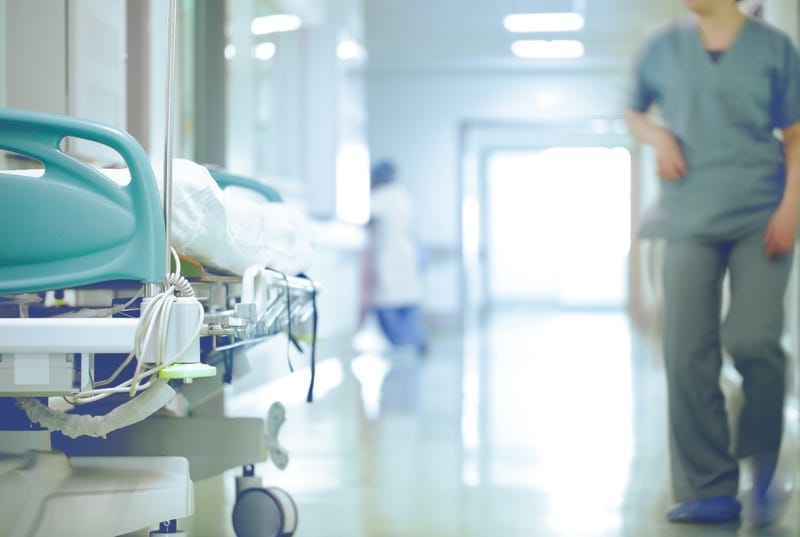
(WWJ) Michigan’s COVID-19 cases are currently on the decline as vaccines remain nearly 80% effective at keeping patients with the virus out of the hospital, according to data from a local health system.
Latest Numbers:
The Michigan Department of Health and Human Services (MDHHS) reported nearly 8,080 cases of the virus in a two-day period (Thursday and Friday), averaging about 4,040 cases each day.
53 people who have tested positive have died during that time, in addition to 69 from weeks or months ago identified through a review of vital records.
2,023 people are hospitalized statewide with a confirmed case of the virus.
About 2,000 fewer cases in total were reported this week than last.
Are The Vaccines Still Working?
70% of Michiganders 16 and older have received at least the first dose of the COVID-19 vaccine, according to the Michigan COVID-19 Vaccine dashboard.
Henry Ford Health System data shows that the vaccines are overwhelmingly effective in keeping people out of the hospital.
In a tweet, Henry Ford said it has a total of 189 people who have tested positive for COVID-19 in their hospitals as of Monday (10/25).
41 (22%) of them are fully vaccinated. 148 (78%) of them are unvaccinated.
62 of those patients are in the Intensive Care Unit. Among them, 11 (18%) are fully vaccinated. 51 (82%) are unvaccinated.
29 patients who have tested positive are on a ventilator. 3 (~10%) are fully vaccinated. 26 (~90%) were unvaccinated.
Henry Ford also posted their numbers from one week earlier. See below:
Last month, Beaumont posted the results of a study of nearly 12,000 patients across its emergency rooms conducted between mid-December 2020 and the end of April 2021. The results found the hospitalization rate was 96% lower among the fully vaccinated (than the unvaccinated).
It found nearly 11,000 patients who visited the emergency rooms were unvaccinated, more than 800 were partially vaccinated, and 129 were fully vaccinated.
Eight people in the fully vaccinated group died, and six others had to be ventilated. All of them were over the age of 65. However, keep in mind, this data was collected during the time or within a couple of months of some of the most high-risk individuals likely receiving their vaccines when protection would still be at or near its peak.
Due to evidence of waning protection over time, the Centers for Disease Control and Prevention (CDC) recommends people who received Pfizer or Moderna get a booster within six months of their second dose if:
-they are 65+
- 18+ living in long-term care settings
18+ with underlying medical conditions including cancer,; liver, lung, heart, kidney disease; organ transplant. (Full list)
- or 18+ who live or work in high-risk settings. That includes teachers, first responders, USPS workers. (Full list).
Anyone over the age of 18 who received a Johnson and Johnson vaccine should receive the booster within two months of their first (and only dose), according to the CDC. The CDC said it’s okay to receive a different manufacturer's vaccine for your booster than you did for your initial dose.
Beyond the Vaccine:
Treatment options with varying degrees of effectiveness exist or are in the pipeline for COVID-19.
Veklury (remdesivir) has been FDA-approved for hospitalized patients 12 years or older. It is the first and only FDA-approved drug to treat COVID-19 (all others are under Emergency Use Authorization).
FDA: Know Your Treatment Options
Available under the Emergency Use Authorization (EUA), four monoclonal antibodies have been shown to reduce death and hospitalization by nearly 80% in early studies. The synthetic antibodies (proteins), made in a lab, prevent the virus from binding to cells and replicating.
It is authorized under EUA to treat mild or moderate COVID-19 in people 12 years or older, weighing 89 lbs. or more, who are high-risk for a severe case of COVID-19 because they are 65 years+, pregnant; have a variety of chronic health conditions (full list.) They can also be eligible if the doctor believes they are likely to progress to a severe case of the virus, even if they don't meet the standard eligibility requirements.
In some cases, it may also be given as a preventative measure to high-risk individuals who have been exposed to the virus.
Monoclonal antibody therapy is not approved for people who are hospitalized with the virus, require oxygen therapy, or a ventilator. Doctors say, to work, it must be administered within ten days of symptoms appearing.
The treatment is usually given in an outpatient setting like a doctor’s office or clinic via IV for about an hour.
The federal government is administering monoclonal antibody treatment for free to the patient. However, the patient may have to pay for any costs associated with administering the treatment.
If you test positive for COVID-19; MDHHS urges you to ask if monoclonal antibodies may be an option for you, even if you do not believe you meet the eligibility requirements.
However, there are shortcomings to monoclonal antibodies: not all hospitals have them, and they are ineffective if the disease has advanced too far.
WHERE TO FIND MONOCLONAL ANTIBODIES NEAR YOU
Additional existing and new drugs might soon be available to fight COVID-19.
In a study published in the Lancet this week; a ~$5 antidepressant—Fluvoxamine—was shown to reduce hospitalizations by 66% and deaths by 91% when given to high-risk patients early in the course of their illness. The dose studied was 100 mg. twice per day over 10 days with 80% adherence (meaning the patient completed at least 80% of their prescribed treatment). The Selective Serotonin Reuptake Inhibitor has been around for about 30 years and is used to treat Obsessive-Compulsive Disorder and Post Traumatic Stress Disorder by targeting inflammation.
Because it already has FDA approval, doctors can prescribe it for patients for COVID-19 under certain circumstances.
Pharmaceutical company Merck is planning to ask the FDA for Emergency Use Authorization as soon as possible for its newly developed pill, Molnupiravir—after its Phase 3 trials revealed it reduced hospitalizations and deaths by approximately 50%, in patients with early disease progression (pre-hospitalization). No deaths were reported in the treatment group after 29 days, and eight were reported in the placebo group. The treatment was administered twice a day over five days.
The study on the pill was stopped in hospitalized patients due to a lack of effectiveness--but continued for patients who were pre-hospitalization. If approved by the FDA, it will be the first oral drug specifically designed to treat COVID-19 (remdesivir is given intravenously).
Bottom line, no entity (drug or vaccine) is 100% effective in fighting this pernicious virus or preventing its worst outcome, but we appear to be well on the way to having even more tools in our arsenal.

